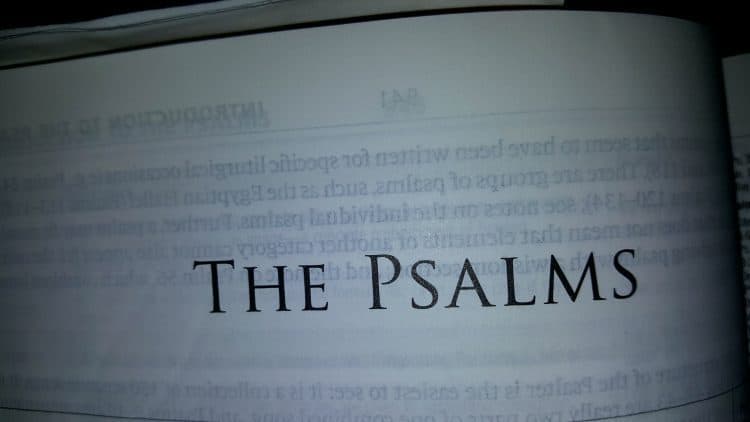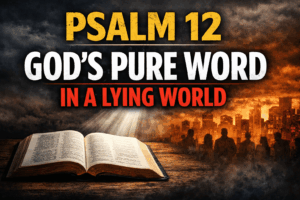⏱️ Estimated Reading Time: 11 min read
Psalm 8:1-9
Chris Cornell, the lead singer of the band, Soundgarden stepped on the platform at the Fox Theater in Detroit on May 17. Two hours after the show ended, he was dead. Medical examiners determined that he had hung himself. Cornell is memorialized as a father and a philanthropist. One writer called him “the elder statesman of rock.”[1]
When I learned the sad news about Cornell, I prayed for his family and friends. I prayed that God would comfort them in their time of sorrow. I went to Soundgarden’s website and noticed they had a full tour schedule ahead of them. So why would a successful and much-loved musician choose to end his life? Blaíse Pascal wrestles with the answer to this weighty question:
“All men seek happiness. This is without exception. Whatever different means they employ they all tend to this end. The cause of some going to war, and of others avoiding it, is the same desire in both, attended with different views. The will never takes the least step but to this object. This is the motive of every action of every man, even of those who hang themselves.”
For this successful singer, ultimate meaning had run its course – and he tragically ended his life.
For other people, the mad dash for meaning is less severe but filled with melancholy, nonetheless. John Lennon famously sought out the Maharishi Mahesh Yogi in 1968 in his quest for meaning.
You may have never traveled to India in search of Enlightenment or sought the counsel of a guru. But each of us is on a mad quest to find our niche; our place in the world. Each of us is on a mad dash for meaning. Your path may include an assortment of things – both good and bad. Solomon had everything under the sun. He regarded it, in the final analysis as “vanity,” a “chasing after the wind.”
ACKNOWLEDGING THE FAME OF GOD
The mad dash for meaning begins by acknowledging the fame of God:
“O Lord, our Lord, how majestic is your name in all the earth! You have set your glory above the heavens. Out of the mouth of babies and infants, you have established strength because of your foes, to still the enemy and the avenger. When I look at your heavens, the work of your fingers, the moon and the stars, which you have set in place …” (Psalm 8:1–3, ESV)
Acknowledging God’s fame means that we confess his greatness. He is to be renowned. He is to be praised. And he alone is to be worshiped.
4 Reasons For God’s Fame
- He is majestic (v. 1).
The word majesty means “mighty, magnificent, strong, awesome, or beautiful in appearance.” The Bible is literally stuffed with passages that point to God’s majesty:
“Glorious are you, more majestic than the mountains fully of prey” (Ps. 76:4, ESV).
“Yours, O LORD, is the greatness and the power and the glory and the victory and the majesty, for all that is in the heavens and in the earth is yours. Yours is the kingdom, O LORD, and you are exalted as head above all” (1 Chron. 29:11).
“Out of the north comes golden splendor; God is clothed with awesome majesty” (Job 37:22).
Notice the scope of God’s majestic influence – “how majestic is your name in all the earth.” Or as Habakkuk 2:14 says, “For the earth will be filled with the knowledge of the glory of the LORD as the waters cover the sea.”
- He is glorious (v. 1).
Glory means “weight, splendor, power, or brightness.” The glory of God is a quality of God’s character that points to his authority and cannot be matched by any other being in the universe:
“Splendor and majesty are before him; strength and joy are in his place” (1 Chron. 16:27, ESV).
“Splendor and majesty are before him; strength and beauty are in his sanctuary” (Ps. 96:6, ESV).
“Bless the LORD, O my sou! O LORD my God, you are very great! You are clothed with splendor and majesty” (Ps. 104:1, ESV).
- He possesses sovereign power (v. 2).
God’s power is an exhaustive power. “God’s omnipotence means that God is able to do all his holy will.”[2] Indeed, God’s power can never be thwarted:
“Worthy are you, our Lord and God, to receive glory and honor and power, for you created all things, and by your will they existed and were created” (Rev. 4:11).
- He created all things (v. 3).
God is the Creator of everything seen and unseen. He created things ex nihilo, out of nothing:
“For by him all things were created, in heaven and on earth, visible and invisible, whether thrones or dominions or rulers or authorities—all things were created through him and for him” (Col. 1:16, ESV).
So David continues to acknowledge the fame of God. He is the absolute, personal God who establishes creation. He is the God who upholds the creation. He is the God who rules his creation and sustains it (Heb. 1:3).
ADMITTING THE FINITUDE OF THE CREATURE
When we contemplate the Creator, we are careful not to impose our views of what we want God to be like. Rather, we search the Scriptures which reveal a true vision of God. When we open our Bibles and gaze upon creation, we should be captivated and consumed by who he is; we should be blown away by his majesty, glory, and power. We must cement the truth that he is the Creator into our brains. Once we have established a God-centered view of God, we can turn our attention to contemplating the creature – all in light of God’s existence and attributes.
The Creature is Finite
John Calvin writes, “Men are never duly touched and impressed with a conviction of their insignificance until they have contrasted themselves with the majesty of God”[3] A passing glance at the vastness of the universe leaves every creature in awe.
When we consider that the planet we live on is a speck in a small solar system on the edge of billions of solar systems in the universe – we get a sense of how truly tiny we are. “We know that light coming to us from the most distant parts of the universe takes billions of years to get here.”[4] And so when we gaze at the stars, we admit our finitude; we acknowledge our “littleness.” We affirm our creaturely insignificance. But move forward in the passage – because this is not the end of the story!
How Does God View His Creation?
Delight
Psalm 8:4 tells us that God is mindful of the creature; that is, he remembers your name. He knows you by name. God cares for the creature – that is, he provides what is necessary for their health, welfare, and protection: “He will tend his flock like a shepherd; he will gather the lambs in his arms; he will carry them in his bosom, and gently lead those that are with young” (Isa. 40:11, ESV).
The creatures are “a little lower than the heavenly beings. God has “crowned him with glory and honor.” God made creatures in his image (Gen. 1:26), and as we shall see, he gave them dominion over the animal kingdom. What is incredibly sad, however, is to see that many people gravitate to the creation instead of the Creator: “Western society has lost sight of God. It no longer sees man as a creature made in God’s image, whose chief end is to glorify God and enjoy him forever. It has eliminated God from its collective conscience.”[5]
Distinction
God not only delights in his creation but he is distinct from them. We refer to this as the Creator/creature distinction. God is independent of his creation. The creature is dependent upon God for absolutely everything.
We as the creatures are distinct from God. As such, we are in a covenant relationship with God. All people, Christians, and non-Christians alike are in this covenant relationship to God and are obligated to obey God: “That obligation of obedience comes by virtue of our being created – we were created as covenant beings. We are people who, by nature, have an obligation to worship and serve the Creator. That much has been true since the beginning.”[6]
The problem, however, is vividly set forth in Romans 1:25 – “because they exchanged the truth about God for a lie and worshiped and served the creature rather than the Creator, who is blessed forever! Amen.”
There is a distinction between the Creator and the creature. He is God, and we are not.
Dominion
Finally, God has given the creature dominion over all things. He has forged a special stewardship agreement with the creature. The dominion that God has given us over creation does not give us a right to destroy it; rather it gives us the privilege of maintaining it, knowing that one day God will rent all things. Indeed, all things will become new!
So we admit the finitude of the creature. We admit that as creatures, we are small. We are sinful. We are fallen. God delights in the creature; he cares for the creature. He has crowned him with glory and honor. Imagine, the God who is majestic and glorious and sovereign; the God who created all things notices you and me! He cares for us. He crowns us with glory and honor!
Conclusion
Every person is on a mad dash for meaning. Some people think they’ll find meaning in a relationship or a career or a boat or a pile of money. Some people, like Chris Cornell, tragically give up the quest for meaning altogether.
The mad dash for meaning begins by acknowledging the fame of God and the finitude of the creature. Such a move is tantamount to faith. Francis Schaefer highlights this important point:
“Salvation is bowing and accepting God as Creator and Christ as Savior. I must bow twice to become a Christian. I must bow and acknowledge that I am not autonomous; I am a creature created by the Creator. And I must bow and acknowledge that I am a guilty sinner who needs the finished work of Christ for my salvation.”
Three closing principles guide people who are on a quest for meaning:
First, we must rivet our attention on God. He must be first and foremost in our thoughts and affections. While never minimizing the significance of man, we must begin with God and his glory if we have any hope of establishing a Christian worldview.
Second, we must remember the finitude of the creature. Such an activity influences how we think about ourselves. It influences how we think about other people. Indeed, people are made in the image of God and are called by God to glorify the greatness of his worth.
Third, return to God. Some readers need to be reconciled to God. Others need to return to their first love. The rebellious creature must be reconciled to the Creator. God sent his Son, the Lord Jesus Christ to live a life we could never live and die a death we all deserve to die. God raised him from the dead on the third day and promised to grant eternal life to every person who turns from their sin and trusts in Christ alone.
The mad dash for meaning begins by acknowledging the fame of God and admitting the finitude of the creature. And that question reaches its culmination in the cross of Jesus Christ. If you come to the end of your quest and the cross is nowhere to be found, you have been deceived. If a pot of gold is at the end of your quest, you have been duped!
Have you acknowledged the fame of God? Have you admitted your finitude? Have you turned from your sin and trusted Christ who enables the creature to stand righteous before a holy God?
[1] Rick Larson, It’s Not What You Think, https://thefirsttenwords.wordpress.com/2017/05/20/its-not-what-you-think/
[2] Wayne Grudem, Systematic Theology (Grand Rapids: Zondervan, 1994), 216.
[3] John Calvin, Institutes of the Christian Religion 5.
[4] James Boice, Psalms 1-41: An Expositional Commentary (Grand Rapids: Baker Books, 2005), 69.
[5] Ibid, 72.
[6] K. Scott Oliphint, Covenantal Apologetics: Principles & Practices in Defense of Our Faith (Wheaton: Crossway Books, 2013), 41.




